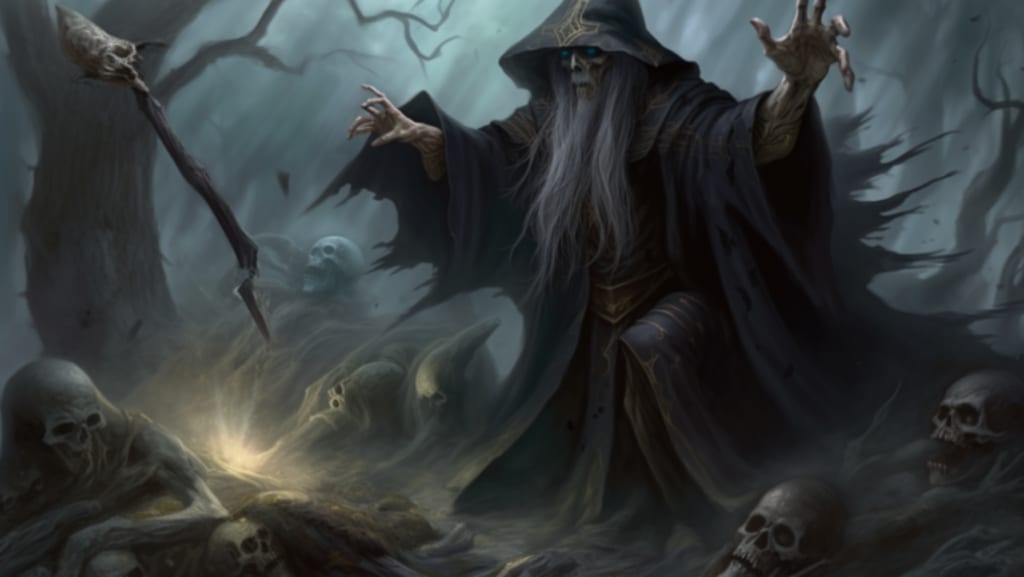Content warning
This story may contain sensitive material or discuss topics that some readers may find distressing. Reader discretion is advised. The views and opinions expressed in this story are those of the author and do not necessarily reflect the official policy or position of Vocal.
The Art of Necromancy
A Historical and Cultural Perspective

Introduction
Necromancy, a term that has fascinated and terrified people throughout history, is the practice of communicating with the dead or manipulating the spirits of the deceased. Often portrayed in literature and popular culture as dark and sinister, necromancy has a rich and complex history that extends across cultures and centuries. In this article, we will explore the concept of necromancy, its historical roots, cultural variations, and its portrayal in modern media.
Historical Roots of Necromancy
Ancient Origins: The practice of necromancy can be traced back to ancient civilizations such as Egypt, Greece, and Rome. In these cultures, necromancers were believed to have the power to summon and communicate with the spirits of the dead for various purposes, including seeking guidance or foretelling the future.
Medieval Europe: During the Middle Ages, necromancy was often associated with witchcraft and heresy. Accusations of necromancy were frequently used to persecute individuals suspected of practicing the occult.
The Renaissance: In the Renaissance era, there was a revival of interest in the occult and mystical practices. Scholars like John Dee and Edward Kelley claimed to communicate with angels and spirits, blurring the lines between necromancy and other esoteric disciplines.
Cultural Variations
African and Afro-Caribbean Religions: Practices similar to necromancy can be found in various African and Afro-Caribbean religions, such as Vodou and Santeria. These belief systems involve communicating with ancestral spirits and seeking their guidance.
Asian Traditions: In some Asian cultures, ancestor worship is an integral part of religious practice. While not synonymous with necromancy, these traditions involve honoring and communicating with deceased ancestors.
Modern Occultism: Contemporary occult and pagan movements may incorporate elements of necromancy, often as a form of divination or spiritual exploration. Some individuals use practices like séances or spirit boards to attempt communication with the dead.
Necromancy in Modern Media
Literature: Necromancy frequently appears in literature, particularly in fantasy and horror genres. Authors like H.P. Lovecraft, Edgar Allan Poe, and J.K. Rowling have incorporated elements of necromancy into their works, creating dark and mysterious narratives.
Movies and Television: Necromancy is a recurring theme in horror movies and television shows. Films like "The Sixth Sense" and TV series like "American Horror Story" explore the eerie and supernatural aspects of communicating with the dead.
Video Games: Many video games incorporate necromancy as a magical or supernatural ability. Players can often raise the dead to fight on their behalf or interact with spectral entities to advance the game's storyline.
Ethical and Moral Considerations
Necromancy, as portrayed in folklore and media, often raises ethical and moral questions about the boundaries of life and death, the consequences of meddling with the supernatural, and the potential for abuse. In reality, the practice of necromancy remains controversial and largely unproven.
Conclusion
Necromancy, steeped in history and shrouded in mystery, continues to captivate our imagination through its presence in literature, media, and various cultural traditions. Whether viewed as a dark and forbidden art or as a means of seeking guidance from the ancestors, necromancy serves as a testament to humanity's enduring fascination with the unknown and the mystical. While its historical roots are fascinating, it is essential to recognize that the practice of necromancy remains a subject of debate and skepticism in the modern world, with many ethical and moral considerations surrounding it.
About the Creator
Enjoyed the story? Support the Creator.
Subscribe for free to receive all their stories in your feed. You could also pledge your support or give them a one-off tip, letting them know you appreciate their work.





Comments (1)
Nice I wish ❤️ I my horrors where this good